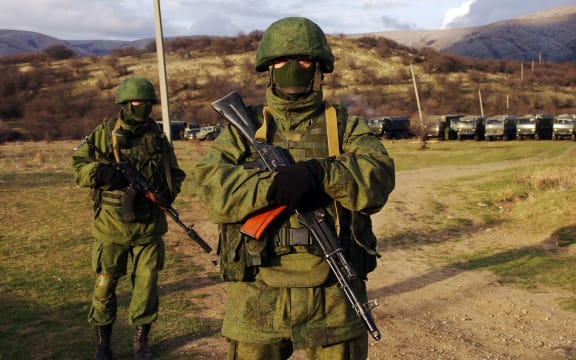Russia has rebuffed Western demands to withdraw forces in Ukraine's Crimea region to their bases amid a day of high-level diplomatic talks.
Russian Foreign Minister Sergei Lavrov met with counterparts from the United States, Britain, Germany and France in Paris on Wednesday to try to start a diplomatic process to defuse the crisis.

Russian forces effectively control Crimea. Photo: RNZ
US Secretary of State John Kerry urged direct talks between Russia and Ukraine during a brief discussion with Mr Lavrov, a US official said.
It was the first time the pair had met face to face since Russian troops effectively occupied Ukraine's Crimean Peninsula, Reuters reports.
Earlier, Mr Lavrov repeated Moscow's assertion that the troops that have seized control of the Black Sea peninsula are not under Russian command.
Asked whether Moscow would order forces in Crimea back to their bases, Lavrov told a questioner in Madrid: "If you mean the self-defence units created by the inhabitants of Crimea, we give them no orders, they take no orders from us.
The West is pushing for Russia to return troops to barracks, accept international monitors in Crimea and Ukraine and negotiate a solution to the crisis through a "contact group" probably under the auspices of a pan-European security body.
EU offers aid
The European Union offered Ukraine's new pro-Western government €11 billion in financial aid in the next couple of years provided Kiev reaches a deal with the International Monetary Fund. Germany, the EU's biggest economy, also promised bilateral financial help.
Ukraine's new finance minister, Oleksander Shlapak, caused a fall in the Ukrainian bond and currency markets by saying his economically shattered country may start talks with creditors on restructuring its foreign currency debt.
And the U.S. Defense Department, in an apparent attempt to signal resolve to Moscow, announced military measures to support eastern European NATO allies adjoining Russia and Ukraine.
France said European Union leaders meeting in Brussels on Thursday could decide on sanctions against Russia if there is no "de-escalation" by then. Other EU countries, including Germany, are more reticent about sanctions.

